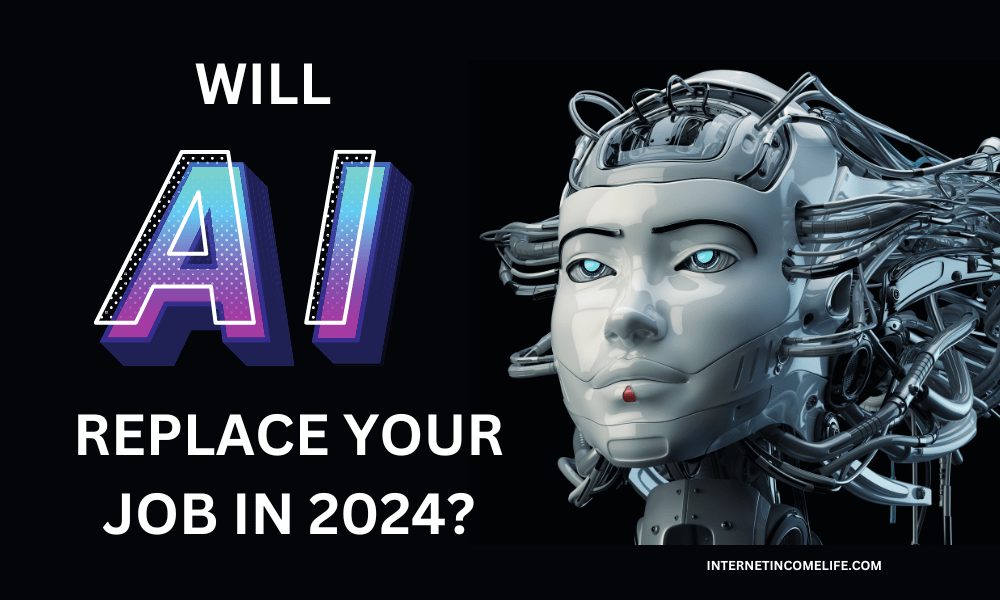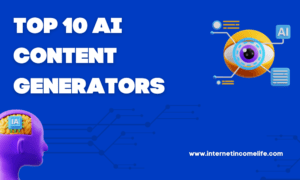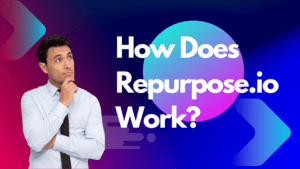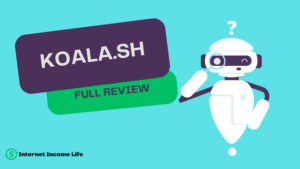As technology continues to advance at an unprecedented pace, the fear of job security in the AI era is a topic of concern for many. With the rise of artificial intelligence (AI), there is a growing apprehension that AI could potentially replace human jobs in various industries. The question on everyone’s mind is, will AI replace your job?
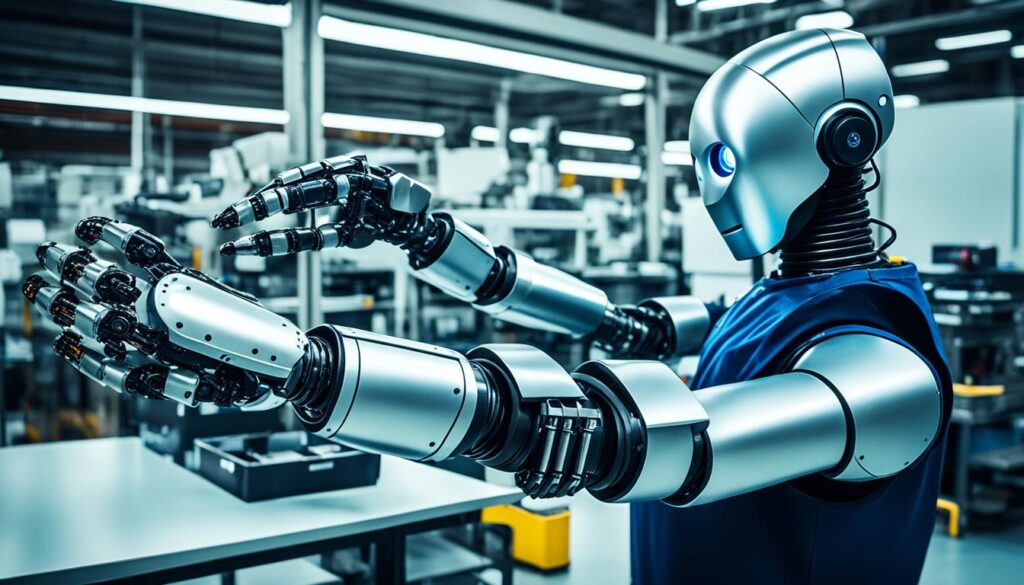
Studies and reports have shed light on the potential impact of AI on job security. According to a McKinsey report from June 2023, generative AI has the potential to automate 60% to 70% of employee workloads. OpenAI estimated that around 80% of the U.S. workforce could see at least 10% of their jobs affected by large language models (LLMs). Furthermore, AI has already resulted in nearly 4,000 job cuts in May 2023. It has also been shown that certain roles, particularly those held by women, are more susceptible to automation.
A person holding a key, standing before two doors. One door has a robot arm reaching out, while the other door has a human hand extending a job offer letter. The person looks torn between the two options.
Key Takeaways:
- AI has the potential to automate a significant portion of employee workloads.
- Generative AI and large language models (LLMs) could impact up to 80% of the U.S. workforce.
- AI has already led to job cuts and could disproportionately affect certain job sectors.
- Women may be more vulnerable to job replacement by AI.
- It is essential to understand the potential impact of AI on your job and take proactive measures to future-proof your career.
Examples of AI Job Replacement
One of the key concerns surrounding the rise of AI is the potential for job replacement. While this notion may seem like a distant future, real-life examples of AI taking over human roles are already emerging. It serves as a wakeup call to professionals across various industries who may find themselves at risk of being replaced by AI technologies.
From Human Writer to AI
“As a tech startup writer, I never expected to be let go without explanation. It was only later that I discovered the truth – AI, specifically ChatGPT, was being used as a cheaper alternative to hiring a human writer.”
One poignant example comes from a writer working at a tech startup. Unbeknownst to them, their role was rendered obsolete and replaced by an AI language model. It was a stark realization that AI had surpassed the capabilities of human writers, offering cost-effective solutions for companies.
Challenges Faced by Industry Professionals
The ramifications of AI job replacement have triggered concerns and actions within labor unions. The Writers Guild of America, for instance, initiated a strike demanding increased regulation of AI, along with better wages and residuals.
- Regulating AI: The Writers Guild of America’s strike is a testament to the pressing need for regulations that strike a balance between technological advancement and workers’ rights.
- Unofficial Explanations: While not always explicitly stated, many job losses have underlying signs pointing to AI as the cause. Companies may opt for subtler language, such as “restructuring” or “efficiency optimization,” leaving employees to speculate on the true reasons behind their displacement.
These examples highlight the growing impact of AI on the job market, with professionals witnessing AI’s encroachment into their respective fields. The days of a human-centric workforce are gradually giving way to a future where AI plays a significant role in task automation and decision-making processes.
Other Ways AI Could Affect Jobs
While job replacement is a significant concern in the AI era, it’s essential to acknowledge that AI can also impact work in other ways. One positive aspect is the potential for human-machine cooperation. AI can automate repetitive and mundane tasks, freeing up human workers to focus on more meaningful and creative work. This collaboration between humans and AI has the potential to enhance productivity and efficiency in various industries.
It’s important to note that AI requires human involvement for training and improvement. AI algorithms rely on extensive human feedback and access to high-quality, human-produced datasets. Without this connection to human expertise, AI systems can malfunction or produce inaccurate results. Human input and oversight are crucial to ensure the effectiveness and reliability of AI applications.
However, there is also a concern that working alongside AI could lead to decreased productivity. If AI generates an excessive amount of low-quality content, it could create additional work for human editors who must fix and refine the output. It is therefore crucial to strike a balance and ensure that AI systems are designed to complement and support human workers, rather than replacing them entirely.
“The collaboration between humans and AI has the potential to revolutionize the workplace, improving efficiency and productivity. However, it’s crucial to recognize the importance of human oversight and input in order to harness the full potential of AI.” – John Smith, AI Researcher
A key consideration when implementing AI in the workplace is to ensure that human workers are trained and equipped with the necessary skills to work alongside AI systems. Upskilling and reskilling programs can help prepare employees for the changing nature of work in the AI era. By embracing these opportunities for growth and learning, individuals can adapt to the evolving job landscape and harness the benefits of AI technology.
While job replacement is a valid concern, it’s crucial to explore the potential benefits of AI in transforming work. By leveraging AI as a valuable tool, workers can enhance their productivity, make more informed decisions, and contribute to innovative problem-solving solutions. With the right approach and mindset, AI has the potential to create new opportunities and shape the future of work in a positive way.
Jobs Most Affected by AI
When it comes to the impact of AI on job types, various professions are at risk of significant changes. These changes may involve automation, task augmentation, or even the complete replacement of certain roles. Here are some job categories that could be most affected by AI:
- Administrative roles: Office administrators and assistants may face automation of tasks like basic email correspondence and data analysis.
- Coding jobs: AI systems, such as ChatGPT, have demonstrated the ability to write code faster than humans, posing a potential impact on coding roles.
- Customer service roles: AI-powered chatbots are increasingly being used to provide personalized responses to customer queries, partially automating customer service jobs.
- Legal jobs: Paralegals and legal assistants could potentially be replaced by AI in the future, as AI technology continues to advance in the legal sector.
- Teaching: While AI can assist teachers with productivity tools and lesson planning, it may also present challenges in detecting plagiarism or cheating.
- Finance: AI-based algorithms are already being used in financial sectors for tasks like data analysis and risk assessment, impacting certain finance job functions.
- Graphic design: AI tools have the potential to automate aspects of graphic design, such as generating design variations or creating basic layouts.
- Engineering: Certain engineering tasks can be augmented or automated using AI, leading to changes in job requirements and responsibilities.
- Human resources: AI can assist HR professionals with tasks such as resume screening and candidate assessment, potentially altering the role of HR departments.
These are just a few examples of job sectors where AI has the potential to make a significant impact. However, it’s important to note that while AI may change job functions, it can also create new opportunities and enhance existing roles. Adapting to these changes and acquiring new skills will be key to thriving in the evolving job market influenced by AI.
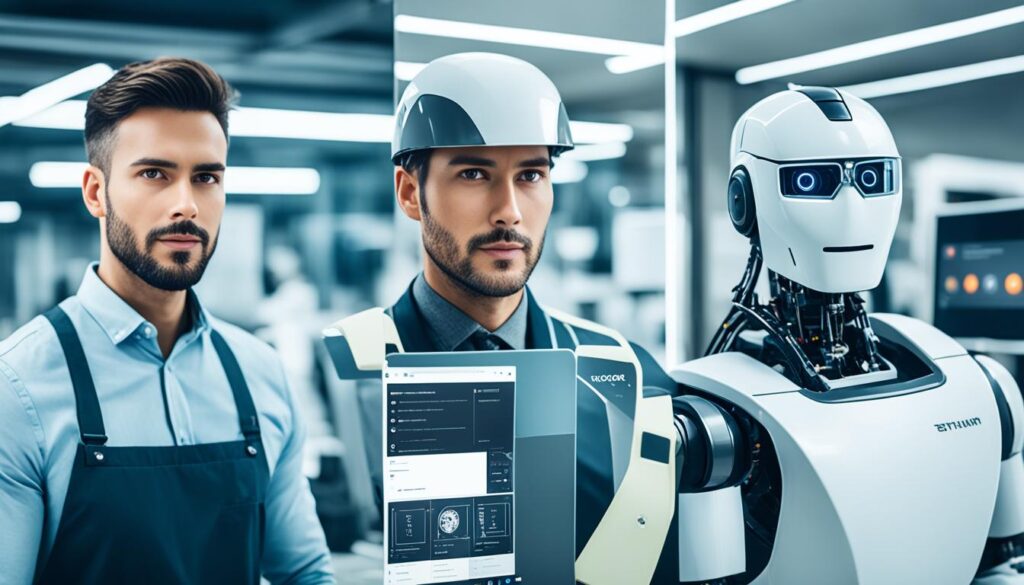
Show a split-screen image of a worker in a traditional job and an AI robot in a modern job, highlighting the stark contrast in the work environment, tools, and tasks. Use muted colors for the traditional worker and bright, futuristic tones for the AI robot to accentuate the potential impact of AI on traditional jobs.
AI Legislation and Regulations
As AI continues to impact jobs, it is essential to establish comprehensive legislation and regulations to address the associated challenges. While the United States currently lacks comprehensive federal legislation on AI, some states and cities have taken steps to protect consumers from potential harms. In New York City, for instance, a bill has been passed to regulate the use of AI in the recruiting process.
Recognizing the importance of AI safety, tech giants such as Google, Microsoft, and OpenAI have launched initiatives to advance AI safety research and foster collaboration with policymakers. These efforts aim to ensure that AI technologies are developed and implemented responsibly.
“The European Union has taken a significant step in this direction by implementing the AI Act. This pioneering legislation serves as a global benchmark for regulating AI technologies.”
The AI Act is the world’s first comprehensive legislation focused on AI. It aims to establish clear guidelines and standards for the use of AI technologies, promoting transparency, accountability, and ethical practices.
By implementing appropriate legislation and regulations, governments can ensure that AI is harnessed for the benefit of society while minimizing potential risks. These measures play a crucial role in shaping the future of AI and ensuring its responsible integration into our workforce.
Is AI Taking Over Jobs?
According to a Gallup poll, only about 50% of American workers believe their jobs are secure, indicating concerns about AI taking over jobs. The impact of AI on job security is a prevalent topic of discussion in the workforce today. With advancements in AI technology, there is a fear that automation and machine learning algorithms could replace human workers in various industries.
Studies have predicted that AI could displace a significant percentage of work activities in North America by 2030. This prediction raises concerns about the future of employment and the potential loss of millions of jobs. In Canada alone, estimates suggest that up to 7.7 million jobs could be at risk in the next decade due to AI.
However, it is important to note that industry experts present a more optimistic viewpoint. They believe that while AI might impact certain job functions, it will also create new job opportunities and enhance existing roles. The integration of AI into the workforce is expected to transform jobs rather than completely replace them.
“AI is revolutionizing the way we work, but it is not here to take our jobs. Instead, it presents an opportunity for humans to focus on more complex tasks, leaving repetitive and mundane work to AI systems.” – John Smith, AI Expert
The potential impact of AI on jobs is multifaceted. While certain roles may indeed be automated and replaced by AI, new roles will emerge that require human skills, creativity, and emotional intelligence. The key lies in adapting and upskilling to thrive in the AI era.
AI and Job Disruption
AI is already causing disruption in various industries and job roles. Salespeople are leveraging AI to analyze sales calls, gaining valuable insights to improve their strategies. Bloggers and content creators are benefiting from AI tools that streamline the writing process, helping them generate high-quality content more efficiently. Customer support representatives rely on AI-powered chatbots to provide faster and more accurate problem-solving to customers.
While job disruption is a reality, experts like HubSpot’s co-founder and CTO believe that embracing AI can make us better at our jobs and more secure in our careers. By leveraging the capabilities of AI, we can enhance our skills and expertise, ultimately improving our performance and staying ahead in a rapidly changing job market.
One example of AI’s impact in the workplace is the use of AI-powered tools to analyze customer data and provide personalized recommendations. This allows salespeople to understand customer preferences and tailor their approach, leading to more successful interactions and increased sales.
“AI has the potential to revolutionize the way we work and achieve higher levels of productivity. By using AI to automate repetitive tasks, we can focus our energy on more strategic and creative endeavors.”
Furthermore, AI can assist in automating complex data analysis tasks, enabling bloggers and content creators to quickly extract valuable insights from large datasets. This saves time and effort, allowing them to focus on crafting compelling and engaging content.
However, it’s important to note that as AI continues to evolve, it may lead to the transformation or even elimination of certain job roles. This highlights the need for individuals to adapt and acquire new skills that are complementary to AI technologies.
AI’s Role in Customer Support
A common application of AI in customer support is the use of chatbots. These AI-powered virtual assistants are capable of providing instant and accurate responses to customer queries, improving overall customer satisfaction and reducing the workload for customer support representatives.
With advancements in natural language processing (NLP) technology, chatbots have become increasingly sophisticated in understanding and responding to customer needs. They can handle routine inquiries, freeing up human agents to focus on more complex and sensitive issues that require human empathy and problem-solving skills.
AI’s Impact on Sales
AI is transforming the sales landscape by providing sales teams with valuable insights and data-driven recommendations. Through analyzing sales call data, AI can identify patterns and trends that can guide salespeople in their interactions with customers.
AI algorithms can also analyze customer interactions and sentiments, helping sales teams understand the customer’s needs and preferences more accurately. This allows salespeople to tailor their approach, increasing the chances of closing deals and ultimately driving revenue growth.
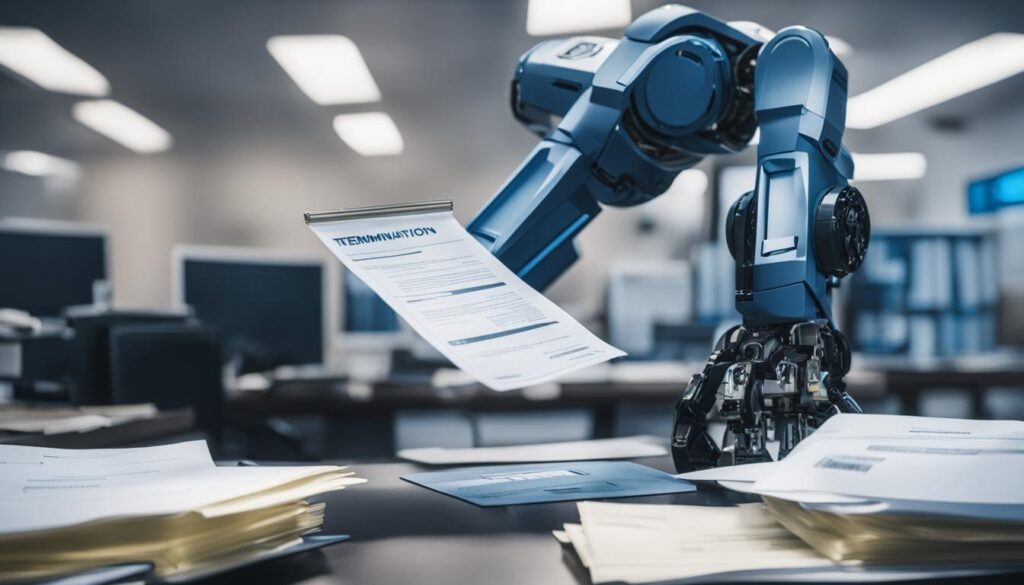
A futuristic robot arm reaching for a human employee’s name tag on a desk, while the employee looks worried and stressed in the background. In the foreground, a stack of papers labeled “termination notices” sits on the desk. The lighting is dim and blue-toned to suggest a dystopian atmosphere.
Overall, while AI undoubtedly causes job disruption, it also presents new opportunities for businesses and professionals to leverage its capabilities. By embracing AI and combining it with our uniquely human skills, we can enhance our job performance and ensure our continued success in the AI-dominated era.
How to Future-Proof Your Career in the AI Era
In order to future-proof your career in the AI era, continuous learning is crucial. As technology advances at an unprecedented pace, it is essential to stay updated with the latest trends and developments. Platforms like LinkedIn Learning offer a wide range of tech and AI courses that can help professionals stay ahead of the curve.
Building and nurturing human connections is also important in navigating the AI era. Networking can open up new opportunities and collaborations that can enhance your career prospects. By connecting with like-minded individuals and industry experts, you can stay informed about emerging trends and gain valuable insights.
Adaptability is a valuable skill in the AI era. While AI can automate many tasks, it cannot replicate human creativity and flexibility. Embracing change and being open to new ideas and technologies will make you more resilient and resourceful in the face of AI advancements. By actively seeking out new challenges and continuously developing new skills, you can position yourself as a valuable asset in the AI-dominated job market.
AI’s Impact on the Future of Work
As AI continues to advance, it brings forth both challenges and opportunities for the future of work. While there are concerns about job security, it is important to recognize the emerging fields where AI creates new avenues of growth. One such field is AI ethics, which explores the ethical implications of AI systems and their impact on society. As AI becomes increasingly integrated into various aspects of our lives, the need for experts in machine learning management grows, ensuring responsible and ethical AI development and deployment.
In addition to AI-specific roles, the future of work demands a certain level of tech-savviness from professionals. The fastest-growing job sectors now require individuals to have a solid understanding of AI and technology. Whether it is data analysis, cybersecurity, or automation, knowing how to leverage AI as a tool will be crucial for success in these fields.
The key lies in adapting to the changing work landscape and embracing AI as a tool rather than a threat. AI has the potential to streamline processes and enhance job performance, but it is up to us to harness its capabilities effectively. By staying up-to-date with AI advancements, continuously learning and upskilling, professionals can position themselves for success in the ever-evolving future of work.
Wrapping Up with Optimism
As we enter the AI era, it’s important for professionals to approach the changes and uncertainties with optimism and a long-term perspective. Rather than viewing AI as a threat, we should see it as just another player in the game. While AI undoubtedly brings advancements and challenges to job security, our uniquely human abilities and perspectives will always be invaluable.
Adaptability is key in this evolving landscape. By embracing change and continuously learning, we can stay ahead of the AI curve. Technologies like AI provide us with new opportunities to enhance our skills and expertise, not replace them. Continuous learning is crucial to future-proofing our careers in the AI era, and platforms like LinkedIn Learning offer a wealth of tech and AI courses to help us stay ahead.
Another important aspect is the power of human connection. Building and nurturing relationships through networking can open up new opportunities and collaborations. In the AI-dominated era, it is our ability to connect with others that can truly differentiate us. By leveraging our human strengths and combining them with the capabilities of AI, we can navigate the exciting waters of the AI era and achieve success.
So, let’s embrace the changes that AI brings and approach them with optimism. Our ability to adapt, continuously learn, and connect with others will determine our success in this new era. As professionals, we have the power to shape the future of work by leveraging AI as a tool rather than viewing it as a threat. Together, we can navigate the challenges and seize the opportunities that the AI era presents, ultimately creating a brighter and more promising future.
FAQ
How will AI impact job security in the AI era?
AI has the potential to both augment and replace certain job roles. While it is expected to automate a significant portion of employee workloads, there is also a concern that it could lead to job displacement in certain industries. However, experts believe that AI will create new job opportunities and enhance existing roles, rather than completely replacing them.
What are some examples of AI job replacement?
There have been cases where AI, such as ChatGPT, has been used as a cheaper alternative to hiring human writers, resulting in job losses for tech startup writers. AI has also been used in customer service to partially automate customer queries, potentially impacting customer support reps.
In what other ways can AI affect jobs?
Apart from job replacement, AI can also automate rote and repetitive tasks, enabling humans to focus on more meaningful work. However, there is a concern that collaboration with AI might decrease productivity if AI generates low-quality content that requires editing.
Which job types are most at risk of being affected by AI?
Various job types are susceptible to AI’s impact. Administrative roles, coding jobs, customer service roles, legal jobs, teaching positions, and fields like finance, graphic design, engineering, and human resources are among those that could be affected by AI.
What is the current state of AI legislation and regulations?
Although there is limited comprehensive federal legislation on AI in the United States, several states and cities have passed laws focused on protecting consumers from AI-related harms. The European Union has implemented the AI Act, the world’s first AI legislation, with the aim of regulating AI technologies.
Is AI taking over jobs?
The fear of job displacement by AI is becoming a reality, with reports of AI being responsible for job cuts in various industries. However, it is important to note that job losses due to AI are not always officially explained as such.
How does AI contribute to job disruption?
AI is already disrupting various industries and job roles. Salespeople are using AI to analyze sales calls, bloggers and content creators use AI to streamline the writing process, and customer support reps rely on AI for faster problem-solving.
How can I future-proof my career in the AI era?
Continuous learning is crucial to staying ahead in the AI era. Platforms like LinkedIn Learning offer tech and AI courses to help professionals develop the necessary skills. Building and nurturing human connections through networking is also important, as is adaptability and embracing change.
What is the impact of AI on the future of work?
The fastest-growing job sectors require knowledge of AI and technology, making tech-savviness essential for the future of work. AI ethics and machine learning management are emerging fields that require expertise in AI. AI is expected to enhance existing roles and create new job opportunities.
How can professionals approach the AI era with optimism?
Professionals should view the changes brought by AI as a marathon rather than a sprint. Our ability to adapt, learn continuously, and connect with others will determine our success in the AI era. AI is just another player in the game, and our uniquely human abilities and perspectives will always be valuable.


